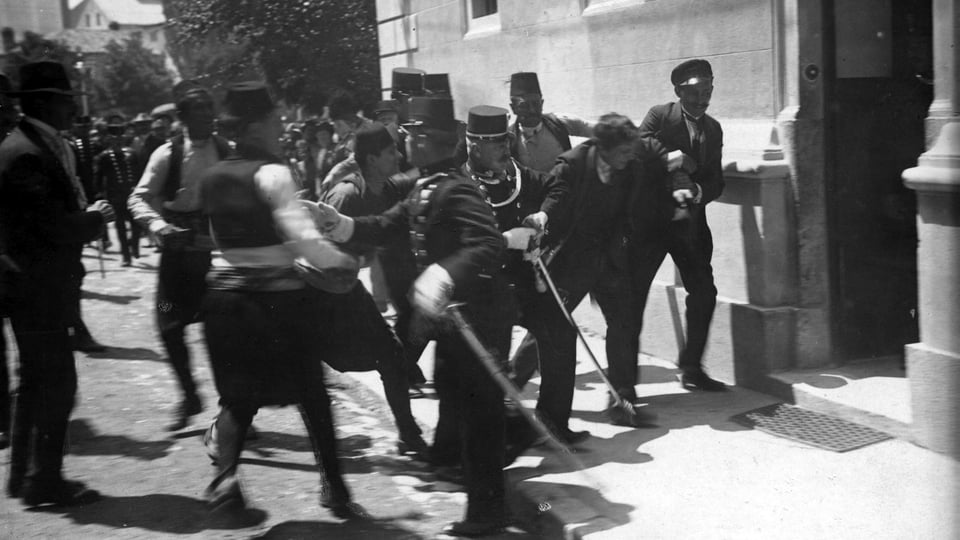World War I Lessons: The Importance of History
One of the most destructive wars in human history started 100 years ago. What have we learned—or failed to learn—since “the war to end all wars”?

On June 28, 1914, a Serbian terrorist named Gavrilo Princip assassinated Archduke Franz Ferdinand of Austria. Within a month, most of Europe, the Ottoman Empire and Japan had declared war. In the next four years, Europe would be nearly decimated; the United States would be drawn into the war; empires would end; a bloody revolution would occur in Russia; and the whole fate of the world would be drastically changed. All these were fruits of World War I.
This blog begins a 4 part series on the lessons we can learn from the history of World War I.
The right question
The philosopher George Santayana famously said, “Those who cannot remember the past are condemned to repeat it.” Time has proven this statement true.
One of the greatest, and saddest, examples of this truth is within the First World War itself. When we think of the war, we may think of soldiers rushing across the no-man’s-land in a desperate attempt to overrun the enemy’s trenches. On the Western Front, this is mostly what the war was. Thousands of young men were sent to their death in an attempt to capture muddy trenches protected by machine guns, barbed wire and land mines.
Yet this didn’t have to be the case. The American Civil War had already proven that trench warfare created mass casualties with little reward. A brief look at a war fought barely 50 years earlier could have uncovered the flaw in trench warfare and saved countless lives.
This puts a different spin on the need to look at history. We really should ask, “Can we afford not to learn the lessons of history?”
This year marks the 100th anniversary of this world-changing war. After 100 years, what have we learned from World War I? Does the war actually have any lessons for us today?
Shaky alliances
One such historical lesson that the leaders in 1914, and today, would do well to learn is that alliances are not always the answer. Nations often turn to alliances, seeking stability and safety on the international scene. The idea is that an alliance with another military power will act as a deterrent against attack from another nation.
But too often human alliances don’t prevent war and only serve to draw more nations into a war.
Relying on alliances was also a mistake made by ancient Israel. God told them, “The LORD has rejected your trusted allies” (Jeremiah 2:37). The Bible records at least one case where honoring such an alliance brought someone into direct conflict with God (2 Chronicles 35:20-22).
The Bible shows that the real answer is to trust in God (Psalm 146:3-5).
World War I escalated because of the networks of alliances between Serbia, Russia, France, Britain and Belgium on one side and Germany, Austria and Italy on the other.
After World War I, an attempt was made to correct this problem by creating the League of Nations, the first international organization dedicated to world peace. Unfortunately, while it had a few successes, the League of Nations was unable to prevent the outbreak of World War II. Its successor, the United Nations, has similarly too often been ineffective; and the world still has tangled alliance systems.
How history helps
Studying history helps us know and understand more about yesterday—and today. History is a collection of stories, stories that are made by and about people just like you and me.
History shows us what was done before. By determining what failed and what worked, we can use the examples of the past to shape a better future. This is the purpose of the Bible’s stories as well (1 Corinthians 10:11).
History also enables us to understand today’s events a little better. It is extremely difficult, if not impossible, to understand the current situation in the Middle East without at least a basic knowledge of the fall of the Ottoman Empire at the end of World War I. An understanding of history also helps us better understand today’s headlines about Russia and Ukraine.
In this series about World War I, we will examine lessons that come from one of the largest conflicts in the history of humanity.
The history is there. Will we learn from it? Or will we be condemned to repeat it?.
This is the first in a four part series on World War I Lessons. For part 2 in this series, see “The Value of Human Life.”
Date Posted: July 14, 2014



